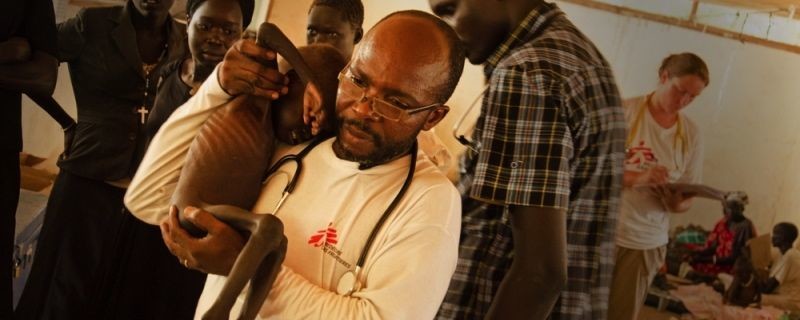‘We’re treating hundreds of severely malnourished children’

Doctors Without Borders (MSF) says more aid groups and more food are needed in southern Unity State, owing to severe malnutrition and other humanitarian problems.
In a press statement, Sarah Maynard, the MSF hospital coordinator in Leer, says that last week the hospital admitted 885 children into its feeding program.
Additionally, MSF is seeing up to 1,200 patients every week in the outpatient department – mostly for malnutrition with acute watery diarrhea, respiratory tract infections and malaria.
“All of those conditions are a result of bad living conditions, living in the open without mosquito nets,” says the medical official.
Leer has changed hands several times since the start of the conflict in December. Initially controlled by SPLA-IO, it was attacked by government troops about a week after the signing of the 23 January ceasefire agreement.
These troops occupied the town until mid-April, leaving behind graffiti saying ‘PK,’ a reference to ‘President Kiir.’ SPLA-IO retook the town in mid-April and holds it until now.
Leer’s County Relief and Rehabilitation Agency (RRA) says that 6323 households were burnt in the county during the time the government held the area.
According to MSF, its hospital in the town was also completely destroyed: “Not even one bed was left in our destroyed hospital, which had been the only secondary health care facility in the whole of southern Unity state.”
Many civilians hid in villages or in the bush around Leer from February to April, and only began returning en masse starting in mid-April, after the town changed hands.
When people returned to Leer area they came back to find empty markets and destroyed homes. Farmers are just starting to plant, but it is months until the harvest.
Some people still have cattle, which they can slaughter for food. The number of cattle being slaughtered in the market is now far more than it was before the conflict.
‘Hard months ahead’
Doctors Without Borders says the crisis that has hit the area is too severe for them to cope with. “We’re doing what we can to help, but it’s not enough,” explains Sarah Maynard.
“We’re treating hundreds of the most severely malnourished, but there are all the moderately malnourished children too. More aid agencies need to come here and start helping these children, to prevent their conditions from deteriorating and some from dying. There needs to be more food distributions,” she added.
The coming months will be ‘dire’ as the rainy season has started and the health and sanitation situation in camps of the internally displaced is deteriorating, MSF stated in a press release.
Other than malnutrition, people are dying of malaria, respiratory tract infections and other preventable diseases; the medical organization warns that the South Sudanese population is already ‘living on a knife-edge’.
Besides working in Leer, MSF is also operating ambulatory therapeutic feeding centres in Nyal and Mayendit, also southern Unity state.
The southernmost county of Panyijar has clinics operated by the aid agencies Medair and IRC.
Photo: An MSF nutrition nurse carries as child back to his mother after making measurements at a therapeutic feeding centre in Leer (Nick Owen/MSF)